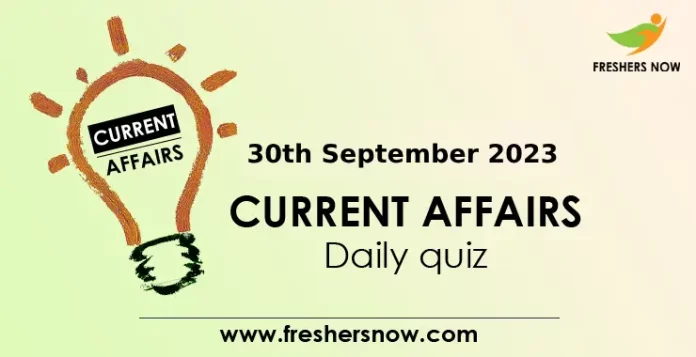
30th September 2023 Current Affairs Quiz: Welcome to the Current Affairs Quiz for 30th September 2023. In this quiz, we will test your knowledge of the latest events, developments, and news from around the world. Stay updated with what’s happening in politics, economics, science, and more as you tackle a series of questions designed to challenge and inform you. Let’s dive into the quiz and see how well you’re keeping up with the ever-changing currents of the world’s affairs.
30th September 2023 Current Affairs | Today GK Quiz
1. Who has assumed the role of Chairman at Tata Advanced Systems Limited (TASL)?
A) Vijay Singh
B) Banmali Agarwal
C) Tata Sons
D) Tata Motors
Answer: B) Banmali Agarwal
Explanation: Banmali Agarwal has taken over as Chairman at TASL, succeeding Vijay Singh.
2. What was the strategic move initiated by Tata Sons in 2018 regarding defense entities?
A) Acquisition of foreign defense companies
B) Consolidation of various group entities into TASL
C) Sale of defense assets
D) Establishment of new defense subsidiaries
Answer: B) Consolidation of various group entities into TASL
Explanation: In 2018, Tata Sons consolidated various group entities, including Tata Power SED, TAL Manufacturing, Tata Advanced Materials, and the defense division of Tata Motors, into TASL to streamline the group’s defense capabilities.
3. What is the current status of PM 2.5 levels in Delhi according to Arvind Kejriwal’s announcement?
A) Increased from 149 in 2014 to 223
B) Decreased from 324 in 2014 to 223
C) Increased from 103 in 2014 to 149
D) Decreased from 149 in 2014 to 103
Answer: D) Decreased from 149 in 2014 to 103
Explanation: Arvind Kejriwal mentioned a decrease in PM 2.5 levels from 149 in 2014 to 103, showcasing an improvement.
4. What measure has been introduced to reduce vehicle-related pollution in Delhi?
A) Mandatory installation of rooftop gardens on vehicles
B) Inspections of Pollution Under Control (PUC) certificates
C) Ban on all diesel vehicles
D) Offering incentives for carpooling
Answer: B) Inspections of Pollution Under Control (PUC) certificates
Explanation: Measures to curb vehicle-related pollution include inspections of Pollution Under Control (PUC) certificates for vehicles, particularly petrol ones older than 15 years and diesel vehicles older than 10 years.
5. What does the fiscal deficit represent in a country’s finances?
A) Government’s surplus revenue
B) Government’s borrowing needs
C) Excess expenditure over revenue
D) Total government expenditure
Answer: C) Excess expenditure over revenue
Explanation: The fiscal deficit represents the gap between government expenditure and revenue, indicating the government’s borrowing needs.
6. What was the Union Budget’s target for the fiscal deficit as a percentage of GDP for 2023-24?
A) 6.4%
B) 5.9%
C) 34.5%
D) 36.2%
Answer: B) 5.9%
Explanation: The Union Budget aimed to reduce the fiscal deficit to 5.9% of the gross domestic product (GDP) for 2023-24, compared to 6.4% in 2022-23.
7. What was the growth rate of India’s core sector in August?
A) 10.0%
B) 12.1%
C) 18.9%
D) 4.2%
Answer: B) 12.1%
Explanation: India’s core sector witnessed a growth rate of 12.1% in August, reaching a 14-month high.
8. Which sector saw the highest growth in August among the core industries?
A) Fertilizers
B) Crude oil
C) Cement
D) Electricity
Answer: C) Cement
Explanation: The cement sector experienced the highest growth among the core industries in August with a growth rate of 18.9%.
9. What is the primary focus of the Asian Development Bank’s (ADB) capital management reforms?
A) Increasing annual new commitments capacity
B) Addressing climate change
C) Providing concessional resources to vulnerable members
D) Expanding the capital adequacy framework
Answer: C) Providing concessional resources to vulnerable members
Explanation: The reforms aim to provide concessional resources to the region’s vulnerable members.
10. What is the expected impact of the $100 billion infusion by ADB into the region over the next decade?
A) A decrease in ADB’s financial capacity
B) An increase in the cost of living in the region
C) Alleviating poverty, enhancing healthcare, and supporting education and livelihood programs
D) A focus on addressing only climate change challenges
Answer: C) Alleviating poverty, enhancing healthcare, and supporting education and livelihood programs
Explanation: The impact of the $100 billion infusion is expected to include alleviating poverty, enhancing healthcare, and supporting education and livelihood programs in the region.
★★ You Can Also Check ★★



